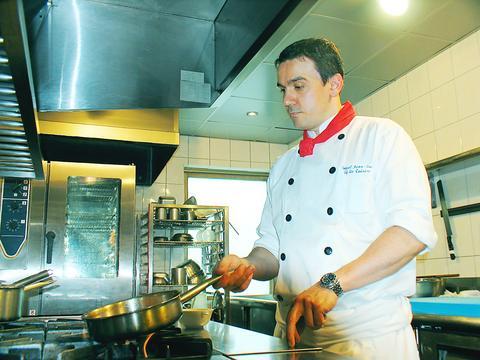One of the most fun activities to do out on the town might have you staying home. Cooking classes at local hotels and culinary schools offer a fresh alternative to dim, stuffy dining rooms by taking you behind the scenes where the magic is made.
There's a menu of options available to would-be chefs from one-day classes in DIY pizza, to month-long courses in the basics of Italian cuisine. And more often than not, the courses are taught by some of the best chefs in Taiwan.
"The thing I enjoy about our culinary classes is that I'm teaching people who aren't professionals," says Jean-Marc Cauquil, the chef at The Sherwood Taipei and instructor of classes held there twice each month. "So there's a great deal I can teach them."

PHOTO: DAVID MOMPHARD, TAIPEI TIMES
Students at the Sherwood are quickly made to look like professionals, though, and given a chef's smock, apron and hat. "So, I also give them a red neck scarf," Cauquil says looking smart in his own.
Classes at The Sherwood and its sister hotel, Le Petit Sherwood, started about three years ago as an activity for hotel guests but quickly found a following among locals, who make up the majority of the classes, according to Cauquil. "About 90 percent of the people who come are ladies," he says.
Another option outside of hotels was originally geared toward more serious students. Taiwanese law requires that anyone wanting to open a restaurant must first pass a culinary quiz and, of course, for every test that must be taken, there is a bushiban to help you pass. Y Tower Culinary School is one of the more popular of these kitchen cram schools and offers weekend courses in a cornucopia of cuisines. You can even get certified to open your own restaurant.
Given the popularity of local night market munchies, it's no surprise there's also a market for learning to be your own roadside restauranteur. Taiwanese oyster omelets, Japanese desserts and sushi and sashimi preparation are just a few of the classes available. Note that there is no test-taking necessary before going into business at your local night market.
Prices for one-day classes at either of the Sherwood Hotels or Y Tower range from NT$900 to NT$2,500, depending on what you make. Materials fees may apply with some of the courses offered at Y Tower and a 10 percent service charge is applied to each of the Sherwood's courses. And best of all, you take home whatever you've made along with printed instructions for recreating it in your own kitchen.
Y Tower's classes are taught only in Chinese, but courses at the Sherwood hotels offer translation
services.
For your information:
WHAT'S COOKIN'
Y Tower Culinary School:
For class times, locations and prices, call (02)2311 2338. Participants must sign up three days prior to the start of class.
Call The Sherwood at (02) 2718 1188 X 3004 to find out class times and prices and to reserve a place. Classes limited to 30 persons.
For information on prices and class times at Le Petit Sherwood,
call (02) 2754 1166.

June 2 to June 8 Taiwan’s woodcutters believe that if they see even one speck of red in their cooked rice, no matter how small, an accident is going to happen. Peng Chin-tian (彭錦田) swears that this has proven to be true at every stop during his decades-long career in the logging industry. Along with mining, timber harvesting was once considered the most dangerous profession in Taiwan. Not only were mishaps common during all stages of processing, it was difficult to transport the injured to get medical treatment. Many died during the arduous journey. Peng recounts some of his accidents in

“Why does Taiwan identity decline?”a group of researchers lead by University of Nevada political scientist Austin Wang (王宏恩) asked in a recent paper. After all, it is not difficult to explain the rise in Taiwanese identity after the early 1990s. But no model predicted its decline during the 2016-2018 period, they say. After testing various alternative explanations, Wang et al argue that the fall-off in Taiwanese identity during that period is related to voter hedging based on the performance of the Democratic Progressive Party (DPP). Since the DPP is perceived as the guardian of Taiwan identity, when it performs well,

The Taiwan People’s Party (TPP) on May 18 held a rally in Taichung to mark the anniversary of President William Lai’s (賴清德) inauguration on May 20. The title of the rally could be loosely translated to “May 18 recall fraudulent goods” (518退貨ㄌㄨㄚˋ!). Unlike in English, where the terms are the same, “recall” (退貨) in this context refers to product recalls due to damaged, defective or fraudulent merchandise, not the political recalls (罷免) currently dominating the headlines. I attended the rally to determine if the impression was correct that the TPP under party Chairman Huang Kuo-Chang (黃國昌) had little of a

At Computex 2025, Nvidia CEO Jensen Huang (黃仁勳) urged the government to subsidize AI. “All schools in Taiwan must integrate AI into their curricula,” he declared. A few months earlier, he said, “If I were a student today, I’d immediately start using tools like ChatGPT, Gemini Pro and Grok to learn, write and accelerate my thinking.” Huang sees the AI-bullet train leaving the station. And as one of its drivers, he’s worried about youth not getting on board — bad for their careers, and bad for his workforce. As a semiconductor supply-chain powerhouse and AI hub wannabe, Taiwan is seeing